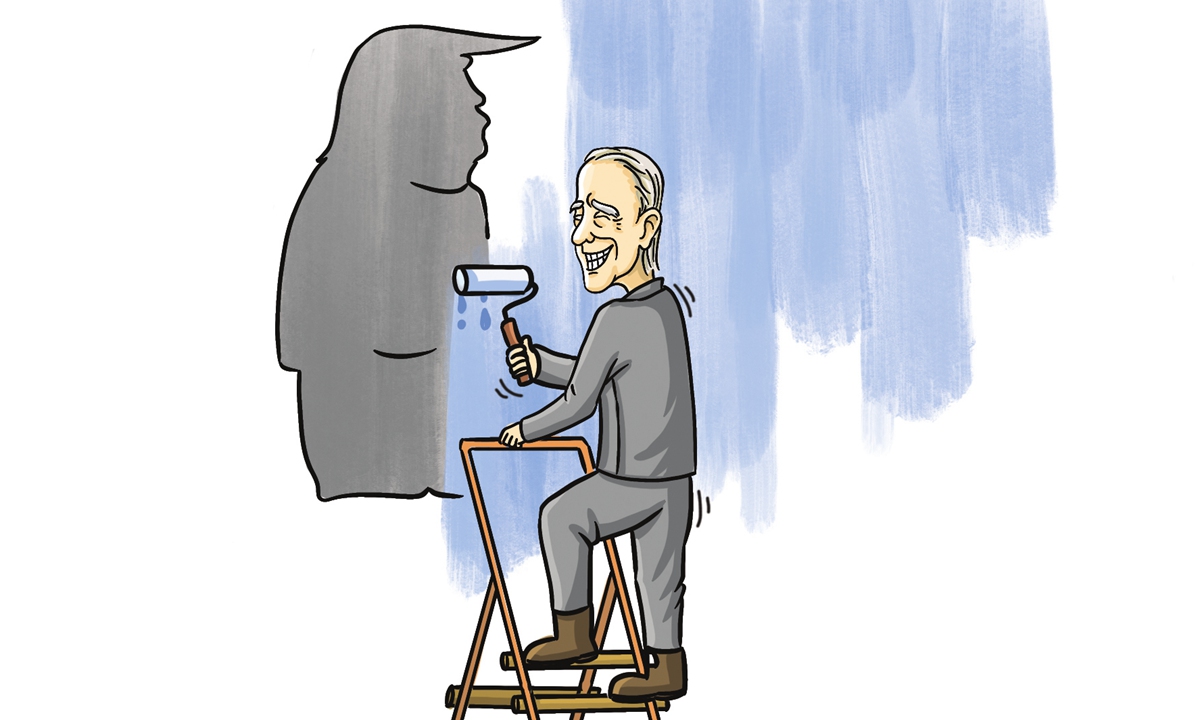‘Trumpism without Trump’ to continue influencing US foreign policy
By Zhao Minghao Source: Global Times Published: 2020/11/26 17:23:40

Illustration: Xia Qing/GT
Since US President Donald Trump took office, he has been adhering to the "America First" doctrine. This has seen him launch trade wars against other countries including US allies, and pull the US out of international organizations and treaties. His foreign policies are defined by strong unilateral characteristics, having dealt a heavy blow to US diplomacy and its international image.As a leading figure of neoconservatism, Robert Kagan, senior fellow with the Brookings Institution, has fiercely criticized the Trump administration's diplomatic policies, especially its attacks on US allies and democratic values. Kagan described the US under Trump as a "rogue superpower."
According to a 13-nation Pew Research Center research report released this September, "Since Donald Trump took office as president, the image of the United States has suffered across many regions of the globe." In the UK and Japan, which are loyal allies to Washington, ratings for the US are at record 20 year lows.
Clearly over the past few years, the "America First" policy has turned into an "America isolated" reality. Particularly, the Trump administration has deepened the cracks in transatlantic relations and thus triggered an endogenous crisis in the liberal international order. As Richard N. Haass, president of Council on Foreign Relations, wrote in his article titled Liberal World Order, R.I.P., "the weakening of the liberal world order is due, more than anything else, to the changed attitude of the US."
Joe Biden, once served as the chairman of the Senate Foreign Relations Committee, is now seeking to restore US' global leadership as the president-elect. He wants to repair the damage the Trump administration has done to US' international reputation and undo the negative effects of "Trumpism." It will not be easy, however, for him to make the US return to its past path of upholding the "liberal international order."
The incoming administration might not directly usher in a new "Biden era" soon, but will instead have to manage a messy continuation of the "post-Trump era." "Trumpism without Trump" will continue to exert an important influence on American foreign policy. In the 2020 presidential election, Trump has been defeated, but he still won more than 72 million general votes. This indicates that domestic and foreign policies of Trump are supported by a large proportion of the American people. The so-called "America First" guideline has had a profound impact on the society. Moreover, the "Trump Doctrine" has also left a deep imprint on US diplomacy.
Biden also will now have to face off with "progressive" forces in the Democratic Party, represented by Bernie Sanders and Elizabeth Warren, who do not want US foreign policy to return to the path characterized by free trade, foreign intervention and so on. In fact, a new generation of Democrats, such as Jack Sullivan, who is among Biden's main foreign policy team, have also undergone a profound shift in their view of international affairs and US foreign strategy. They do not favor a simple return to the "liberal international order."
Fundamentally, the crisis of the liberal international order is closely related to profound challenges arising from domestic disharmony that has arisen in the US and Western countries.
The deep divisions in US society in relation to political parties, ethnicity, and class will be difficult to heal in the future. Thomas Carothers, senior vice president for studies at the Carnegie Endowment for International Peace, said the 2020 US presidential election, "brought to a brutal head how politically polarized the US is." He predicted, "more polarization ahead."
Washington's top priority is to tackle the inequality at home, rather than return to the so-called liberal international order. Daron Acemoglu, Institute Professor at MIT, echoed this sentiment saying, "Median wages have been stagnant for about 40 years, and the real earnings of many groups, especially men with low educational levels, have fallen precipitously."
The US under Biden may have to discard nostalgia for the prior liberal international order. The core of the liberal international order has been gravely undermined. It will be difficult for the incoming Biden administration to eliminate illiberal populism in the US. Other Western countries seem incapable of achieving this as well.
The author is a senior research fellow at the Charhar Institute and an adjunct fellow at the Chongyang Institute for Financial Studies at Renmin University of China. opinion@globaltimes.com.cn
Posted in: VIEWPOINT